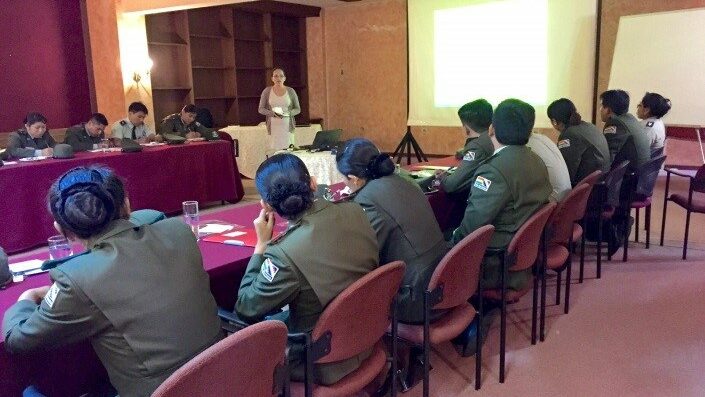Protecting Children from Violence in Bolivia by Enforcing the Laws

LA PAZ, BOLIVIA – Sexual violence is endemic in Bolivia, but only a fraction of rapes are ever reported. One-third of all Bolivian girls will suffer sexual abuse before they turn 18, according to local reports.
Two years ago, a new law passed and a special police force was created to handle these crimes. Now it’s a matter of equipping these officers to enforce the law.
Earlier this year, IJM led a special training for these law enforcement professionals.
Why Building Capacity Matters
Imagine an 8-year-old girl in a police station. She has come to tell this special police unit how she was raped.
She is led to a crowded room full of uniformed men and women working at their desks, perhaps talking on the phone or to each other, perhaps watching as she enters. She is told to sit at one of these desks. A police investigator then proceeds to ask her where her stepfather touched her and how often.
Now imagine a police investigator.
He gets paid less than his colleagues in the narcotics force but works equally long hours. His office is completely under resourced—he has to purchase his own gun and often there aren’t even enough pens or notebooks for all staff members.
He needs to record the testimony of an 8-year-old rape victim. There is no interview room or empty office in which to conduct the interview. So he takes her to his desk and sits her down. His job is to ask her questions and record her answers. He asks to borrow a colleague’s pen and paper.
Interviewing is a striking example of how the lack of resources can affect survivors of abuse. Many are minors, boys and girls abused by those closest to them–children who are suffering significant trauma.
Equipping Officers to Protect Children and Create Change
IJM has been working in Bolivia since 2007 to investigate child sexual assault crimes and prosecute the perpetrators. Earlier this year, the Special Force in the Fight against Violence (known by its Spanish acronym, FELCV) invited IJM to train 75 of the new police investigators in this unit. (The Danish government invested in the week-long training program and will continue supporting this unit financially.)
The training in February 2015 was an intensive week of 12-hour days. IJM staff led modules focused on equipping investigators involved in cases of child sexual violence, but covered a variety of topics, including: the legal framework for sexual offences, forensic interviews, informants and operations, surveillance and counter-surveillance, interrogation, reporting, and staff care, as well as sexual deviance.
In addition to the knowledge and skills acquired by the participants, the training was a key opportunity for IJM Bolivia to share about its collaborative casework. Investigators gained an understanding of IJM’s experience in the field of child sexual assault, particularly the need for empathy, on the one hand, and self-care on the other.
Immediate Impact of the Training
IJM Bolivia’s senior investigator noted that one key achievement of the training week was that participants were now able to put themselves in the position of their clients and be more sensitive to the needs of victims. The sessions helped them see how their conduct in interviews, for example, affected the well-being and the evidence of survivors. They began to understand how difficult it could be for a victim of sexual violence – and much more a child victim – to talk about the abuse.
IJM Aftercare Director, Analía Velásquez, explained in one of her sessions the need for investigators to protect themselves from secondary trauma caused by working regularly and closely with victims of abuse. This concept, while initially met by resistance from participants, was something they gradually came to understand and appreciate.
"It really was very helpful to have investigators from the different departments [provinces] of Bolivia come together to exchange ideas,” said Captain Gabriela Gúzman, Chief of the Sexual Crimes Unit of the FELCV in Santa Cruz. "It was one of the best trainings we’ve had.”